
GGI program on Glassy aspects of classical and quantum computation Florence, 5 July 2019
Can adiabatic methods help 'unsolve' a hard problem

Hanrong Chen John Barton Arup K. Chakraborty
Mehran Kardar (MIT)
Fitness & Mutation
![]() Elements of Population Genetics:
Elements of Population Genetics:
Fitness f governs reproduction rates according to
Population mean is defined by
Mean fitness evolves as
Affinity ω is a trait correlated with fitness, and (including possibility of mutations) evolves as
![]() Manfred Eigen's Quasispecies Model and the error catastrophe.
Manfred Eigen's Quasispecies Model and the error catastrophe.
Mapping to Quantum Ising chains (Wagner, Baake, Gerisch, J Stat. Phys, 92, 1017 (1998)) (offline)
![]() To use the
To use the ![]() equations in Affinity Maturation, we need to describe the dependence of fitness on affinity.
equations in Affinity Maturation, we need to describe the dependence of fitness on affinity.
Joachim Krug's GGI seminar on fitness landscapes.
An evolutionary version of the Random Energy Model (offline) ['House of cards' model]
HIV
![]() Human immunodeficiency virus infects CD4 cells of the immune system: (wikipedia)
Human immunodeficiency virus infects CD4 cells of the immune system: (wikipedia)
![]() HIV life cycle and associated drug targers: [P.A. Volberding & S.G. Deeks, Lancet 376, 49 (2010)]
HIV life cycle and associated drug targers: [P.A. Volberding & S.G. Deeks, Lancet 376, 49 (2010)]
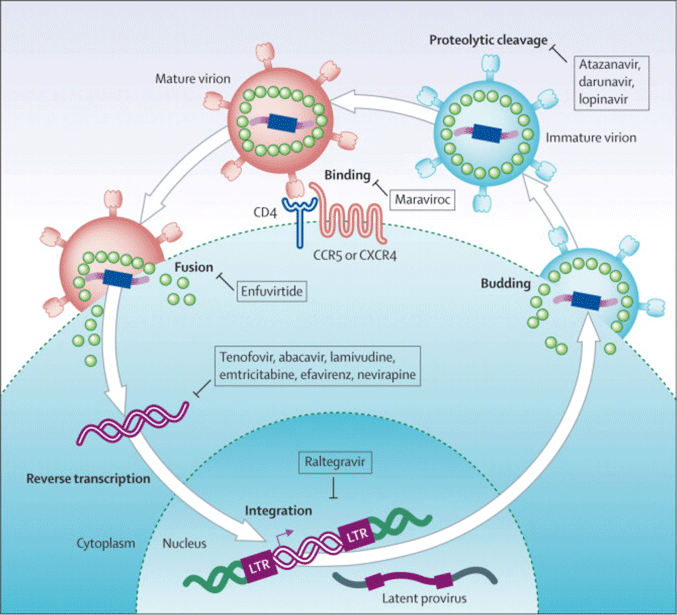
![]() Progress of HIV infection: (wikipedia)
Progress of HIV infection: (wikipedia)
HIV Fitness Landscape
![]() HIV mutates rapidly in host, due to:
HIV mutates rapidly in host, due to:
Large number of replications (1010 virions per day) [Perelson et al, Science 271, 582 (1996)]
Transcription errors (10-4 - 10-5 per base per cycle) [Perelson et al, Science 271, 582 (1996)]
Recombination (10-5 per site per generation) [R.A. Neher & T. Leitner, PLOS Comp. Bio. 6, e1000660 (2010)]
![]() There is large sequence diversity: [B. Korber, IAVIReport (2010)]
There is large sequence diversity: [B. Korber, IAVIReport (2010)]
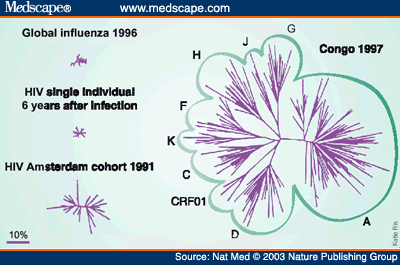
![]() Patient-derived sequences can be used to construct a prevalence landscape, using a
Patient-derived sequences can be used to construct a prevalence landscape, using a
![]() Patient-derived sequence frequencies are outcome of many factors, incluing
Patient-derived sequence frequencies are outcome of many factors, incluing
![]() Empirical evidence suggests that prevalence is a reasonable proxy for replicative fitness
Empirical evidence suggests that prevalence is a reasonable proxy for replicative fitness
[A.L. Ferguson et al, Cell Immunity 38, 606 (2013)] (gag)
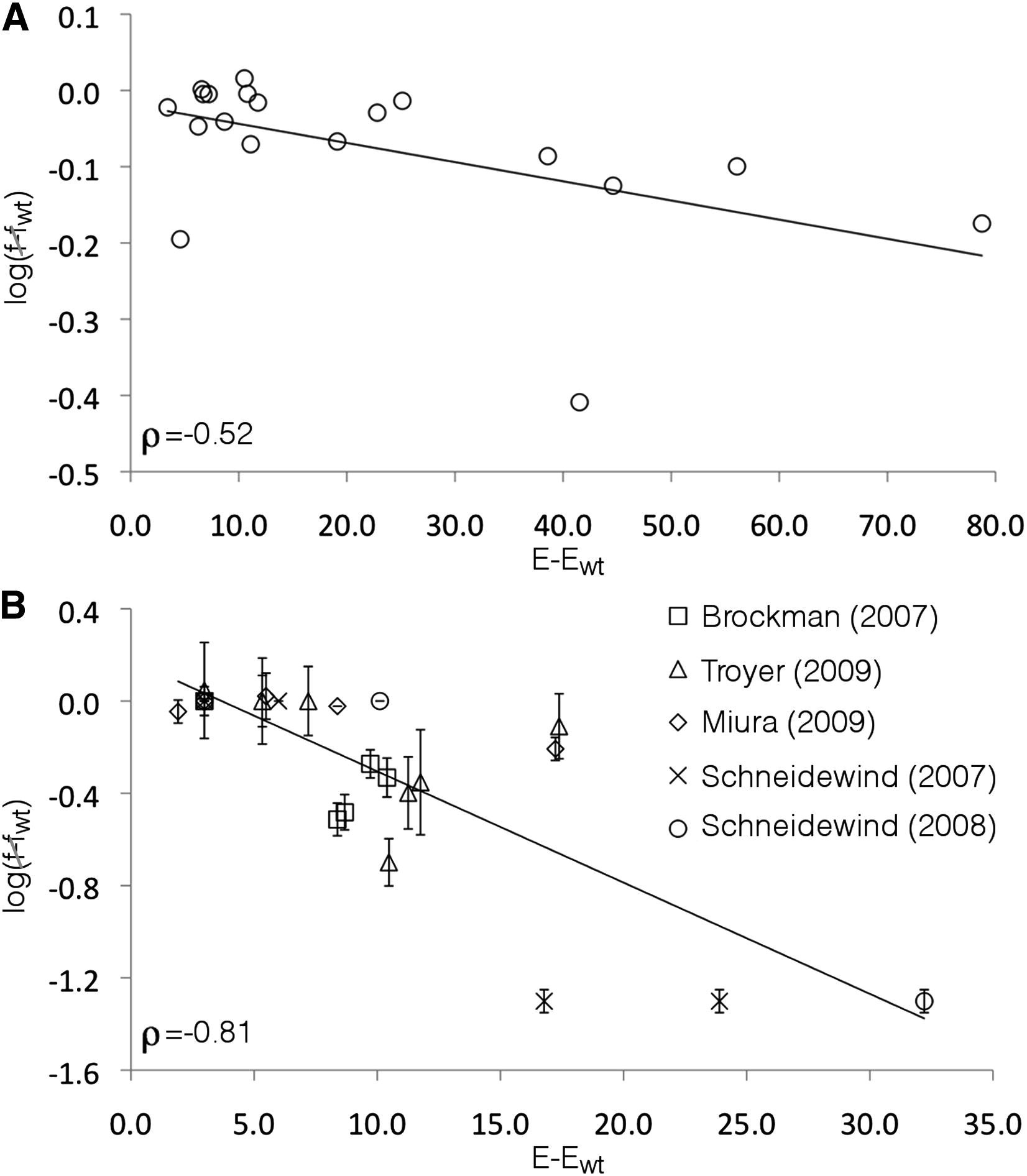
![]() Potential uses of the prevalence landscape as a proxy for the fitness landscape:
Potential uses of the prevalence landscape as a proxy for the fitness landscape:
Immunogenic versus non-immunogenic proteins
Design of vaccines
Evolutionary Mean-Field Dynamics
![]() Assume a fitness landscape for viral sequence (single protein or whole genome),
Assume a fitness landscape for viral sequence (single protein or whole genome),
[binary (0 for consensus, 1 for mutant) of length L] including one site and two site terms.
Add an additional cost from epitopes targeted by the host immune system (mostly T cells for HIV):


Use the
equations to compute the time evolution of single site mutation probabilities

![]() ,
,
where the "mean-field approximation" from statistical physics gives
=h_i.jpeg)
_pro.jpeg)
The essence of the `mean-field approximation' is the neglect of the correlations between sites, setting
![]()
Such `linkage equilibrium' is achieved in population genetics if the sequence elements are completely reshuffled post replication, i.e. for infinite recombination rate [Neher & Shraiman, Rev. Mod. Phys. 83, 1283 (2011)] (offline)
![]() How well does this approach work in an actual patient?
How well does this approach work in an actual patient?
Patient CH58 [Liu et al, J. Clin Invest 123, 380 (2013)] infected with HIV
Blood samples extracted at several time points to determine HIV sequences; T cell responses were also mapped.
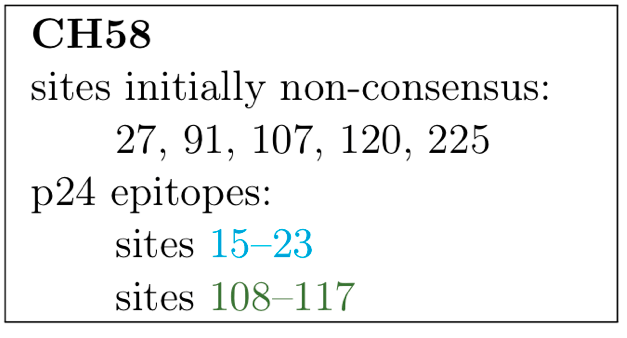
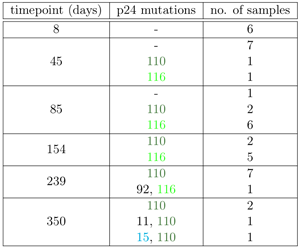
Putative fitness landscape of p24 was constructed using maximum entropy approach on sequence diversity.
Given the many approximations involved, the results of mean-field dynamics are encouraging:
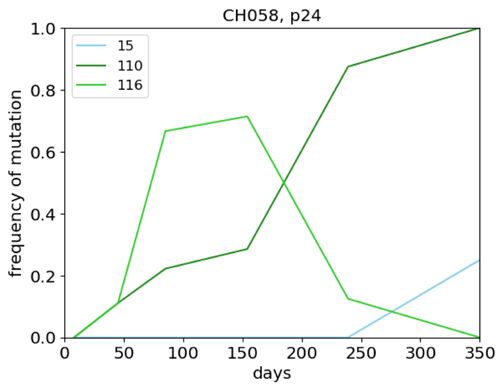 vs.
vs. 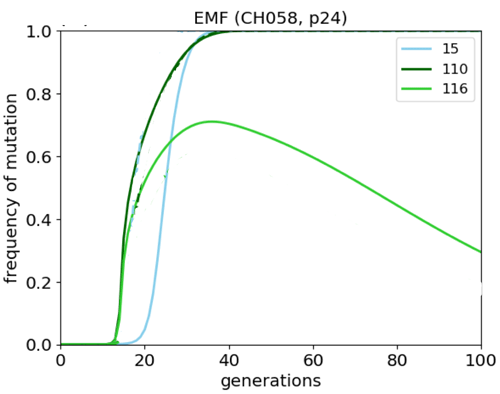
GGI program on Glassy aspects of classical and quantum computation Florence, 5 July 2019
Can adiabatic methods help 'unsolve' a hard problem

Hanrong Chen John Barton Arup K. Chakraborty
Mehran Kardar (MIT)